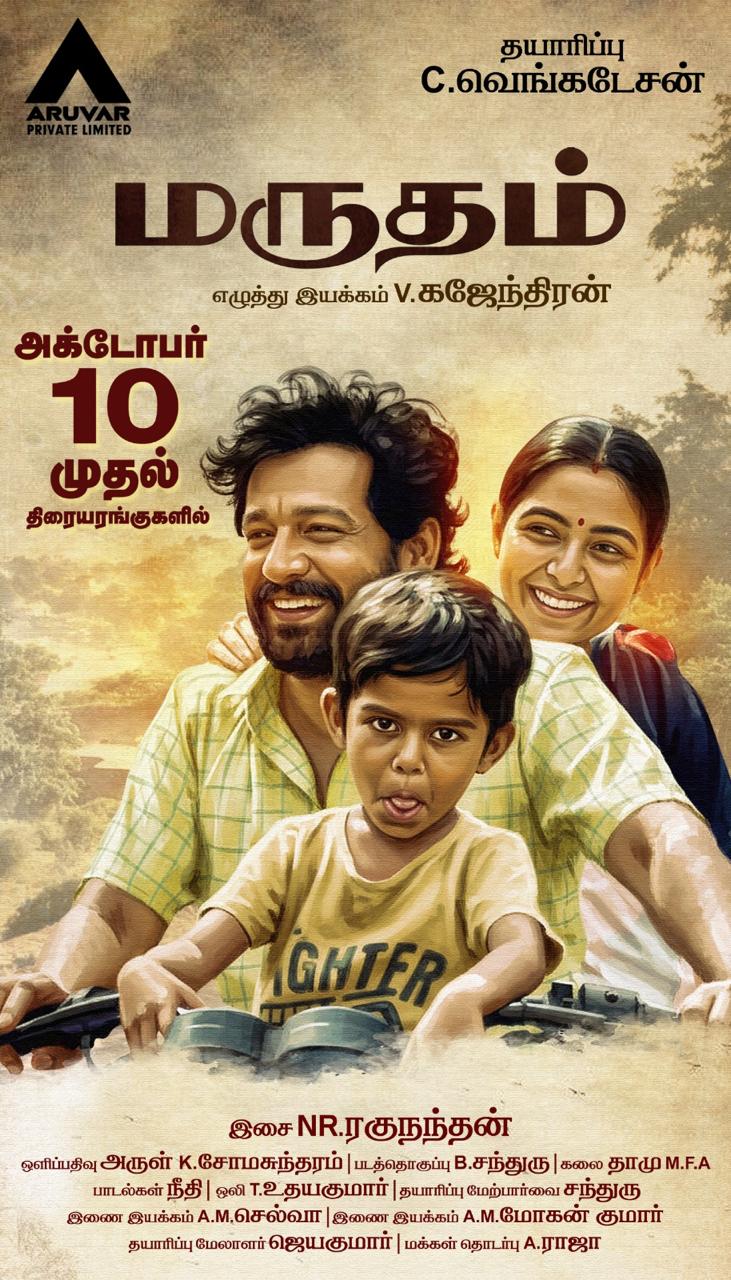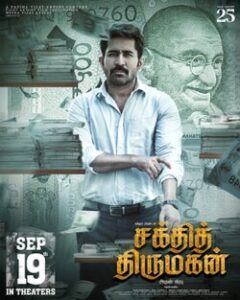Cast:
- Vidaarth – Kanniyappan
- Rakshana – Sinthamalli
- Aruldoss – Kathirvel
- Maran – Pazhani
- Dinanthorum Nagaraj – Kanthan
- Saravana Subbiah – Rajasekar
Crew:
- Written & Directed: V. Gajendran
- Music: N. R. Raghunandhan
- Cinematography: Arul K. Somasundaram
- Producer: C. Venkatesan
- Production Company: Aruvar Private Limited
- PRO: A. Raja
Marutham, written and directed by V. Gajendran, is a rural drama that explores the life of a farmer and the challenges faced by villagers due to fraud and corruption. The film stars Vidaarth in the lead role as Kanniyappan, with Rakshana playing his supportive wife Sinthamalli and Aruldoss as Kathirvel, a trusted friend who guides him through difficult times. Produced by C. Venkatesan under Aruvar Private Limited, the movie features music by N. R. Raghunandhan and cinematography by Arul K. Somasundaram. The narrative is deeply rooted in Tamil culture, inspired by Sangam literature, where the land was divided into five “thinai” (landscapes) known as Kuruji Neelangal. Each landscape -Kurinji, Mullai, Marutham, Neithal, and Paalai -represents a distinct region, emotion, and way of life, reflecting the deep connection between people and their environment. The title Marutham symbolizes the fertile land of the village and the life that revolves around it.
In the film, Kanniyappan is a hardworking farmer living a simple life with his wife Sinthamalli and their young son, Pattu. With dreams of giving his son a brighter future, he insists on enrolling Pattu in an international school rather than a government school. To pay the required 3 lakh donation, he pledges his farmland to his well-wisher Kathirvel, hoping that his son will grow up speaking English and achieving greater opportunities in life. The film effectively sets up Kanniyappan’s aspirations and love for his family as the emotional core of the story.
However, things take an unexpected turn when Kanniyappan discovers that his land has been sealed and occupied by unknown parties. On visiting the police, he learns that SBMI Bank has fraudulently claimed his land using fake documents and MOUs. The film highlights how banks exploit innocent farmers, creating tension as Kanniyappan finds himself powerless against a powerful organization. SBMI Bank officials are shown monitoring his activities, adding to the suspense and realism of the narrative.
Seeking justice, Kanniyappan approaches an advocate recommended by Kathirvel. While high-end advocates demand exorbitant fees, the down-to-earth lawyer helps him gather evidence and guides him to argue his own petition in court. The film emphasizes perseverance and truth as Kanniyappan collects strong evidence exposing the bank’s fraudulent activities. The courtroom sequences are engaging and realistic, showing that determination and honesty can triumph even in challenging circumstances.
Eventually, the court rules in Kanniyappan’s favor, returning the land to him. The film brings to light the suffering of farmers and the fraudulent practices of banks, transitioning the story from darkness to hope. The cast delivers authentic performances, speaking in the local village Tamil dialect, which adds realism and helps viewers connect with the emotional journey. The movie also emphasizes moral values and harmony in education, as Kanniyappan ultimately chooses a government school for Pattu, appreciating the essence of learning and humanity rather than prestige.
Overall, Marutham is a heartfelt drama that balances social commentary with personal storytelling. Vidaarth delivers a sincere performance as a determined farmer, while Rakshana and Aruldoss provide strong emotional support. The technical aspects, including N. R. Raghunandhan’s music and Arul K. Somasundaram’s cinematography, enhance the storytelling without overpowering it. The film successfully portrays rural life, farmers’ struggles, and the triumph of integrity and justice, making it a moving watch for audiences of all ages.







